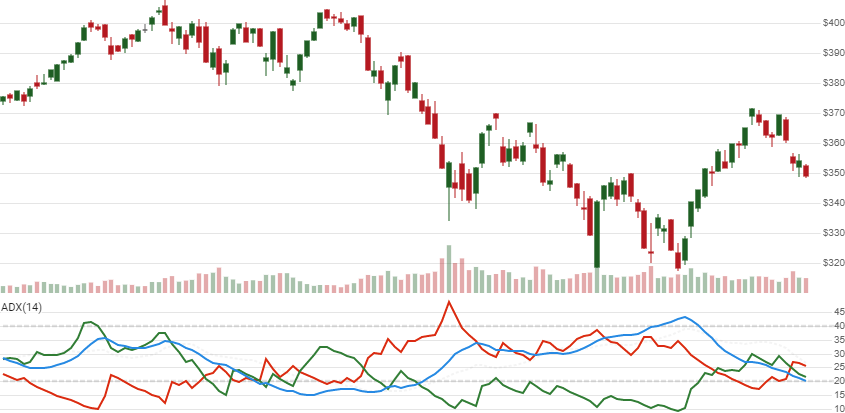Average Directional Index (ADX)
Created by J. Welles Wilder, the Directional Movement Index (DMI) and Average Directional Movement Index (ADX) is a measure of price directional movement. It includes upward and downward indicators, and is often used to measure strength of trend. [Discuss] 💬

// C# usage syntax
IEnumerable<AdxResult> results =
quotes.GetAdx(lookbackPeriods);
Parameters
lookbackPeriods int - Number of periods (N) to consider. Must be greater than 1. Default is 14.
Historical quotes requirements
You must have at least 2×N+100 periods of quotes to cover the warmup and convergence periods. We generally recommend you use at least 2×N+250 data points prior to the intended usage date for better precision.
quotes is a collection of generic TQuote historical price quotes. It should have a consistent frequency (day, hour, minute, etc). See the Guide for more information.
Response
IEnumerable<AdxResult>
- This method returns a time series of all available indicator values for the
quotesprovided. - It always returns the same number of elements as there are in the historical quotes.
- It does not return a single incremental indicator value.
- The first
2×N-1periods will havenullvalues forAdxsince there’s not enough data to calculate.
⚞ Convergence warning: The first
2×N+100periods will have decreasing magnitude, convergence-related precision errors that can be as high as ~5% deviation in indicator values for earlier periods.
AdxResult
Date DateTime - Date from evaluated TQuote
Pdi double - Plus Directional Index (+DI)
Mdi double - Minus Directional Index (-DI)
Adx double - Average Directional Index (ADX)
Adxr double - Average Directional Index Rating (ADXR)
Utilities
See Utilities and helpers for more information.
Chaining
Results can be further processed on Adx with additional chain-enabled indicators.
// example
var results = quotes
.GetAdx(..)
.GetRsi(..);
This indicator must be generated from quotes and cannot be generated from results of another chain-enabled indicator or method.